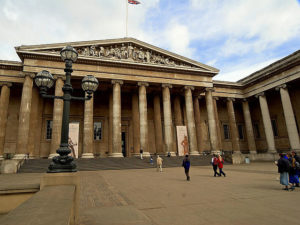The British Museum has not had the best year. The end of 2023 cannot come fast enough for the museum administration and its supporters. 2023 saw the museum plagued by scandals, the most devastating of which involved a senior staff member accused of stealing thousands of antiquities from museum storerooms. Calls for the restitution of important cultural artifacts to their countries of origin have not only increased but, as a result of the theft, have gained more traction. And now, as if the year couldn’t get any worse, this week, the scandal hit the museum again with a one-two punch: the museum’s deputy director has stepped down, and now an independent review conducted in the wake of the theft has proven to be damning for the museum.
British Museum director Hartwig Fischer stepped down from his post shortly after the initial story broke about the thefts allegedly committed by former curator Peter John Higgs. On December 13th, the museum announced that its deputy director, Jonathan Williams, will also leave. Williams had taken a step back from his official duties after Fischer’s resignation, but now he is leaving the museum entirely. At this point, it is unclear whether he has been fired or if he resigned. His departure was mainly because of his lack of action when Gradel brought the missing artifacts to his attention in 2021. Higgs’s attempts to sell certain items on eBay drew the attention of Danish art dealer Ittai Gradel, who collected evidence on these items and the account selling them between 2016 and 2021. Most damning was a PayPal receipt with Higgs’s name and address. Despite this evidence, Williams dismissed these accusations, prompting Gradel to go to the museum chairman, George Osborne, who referred the matter to the police. Also, thanks to Gradel’s efforts, the museum conducted internal audits of the Greece & Rome department in April 2022 to see if items were missing. The fact that Williams was simply allowed to step back but keep his position immediately after this information became known had some people outraged. Gradel, in particular, had some fiery words for the outgoing deputy director. He said Williams “displayed incompetence to a degree which should have resulted in immediate resignation or failing that immediate dismissal.”
Williams’s departure came the day after the independent review, conducted by a panel comprised of corporate lawyer and former British Museum trustee Sir Nigel Boardman, chief constable Lucy D’Orsi, and deputy high court judge Ian Karet. The panel submitted suggestions and recommendations regarding policy, security, and risk assessment. They suggested, for example, that the museum should make an effort to register or catalogue all the items in its collection and establish set procedures for registering items. It also recommended finding ways to “improve its policy for reporting unlocated objects”. Furthermore, the panel suggested that the museum’s current methods of calculating risk “should be replaced with one that draws on best practice in peer institutions.” In making this recommendation, they cited the manual put out by the British Treasury, often known as the Orange Book, which covers risk management. Of the roughly 1,500 items stolen from museum archives and storerooms, only 351 have been returned, all but one of which were due to Gradel’s efforts. Another 350 or so have been identified but have not yet been returned. However, it has been incredibly difficult for Gradel and museum staff to locate and identify the stolen pieces. Because Higgs tended to steal small artifacts that staff had not properly catalogued, we cannot be certain that these pieces were once in the British Museum’s collection. Another 350 items are still at the museum but have been damaged or destroyed by having their gold mounts and precious stones removed. These missing parts have likely been sold for scrap.
According to the administration, the museum is already in the process of enacting around a third of the policy recommendations the panel suggested in its review. The full report cannot be released because of the ongoing police investigation. However, the investigation has become increasingly difficult because Higgs, the main suspect, has proven uncooperative.
The Higgs theft has weakened public trust in the museum and its leadership. It has also blown an enormous hole in the remaining argument about keeping foreign cultural artifacts in London. Politicians, activists, and large swaths of the general public have called for the repatriation of treasures like the Parthenon Marbles of Greece, the Benin Bronzes of Nigeria, and the Maqdala Collection of Ethiopia. And now, just this week, Lord Frost, a former diplomat and Conservative member of the House of Lords, has called for the Parthenon Marbles’ return to Athens. When the former chief Brexit negotiator, a figure closely linked to Boris Johnson’s government, calls for this kind of action to strengthen Anglo-Greek relations, you know things have gone wrong for your cause.

